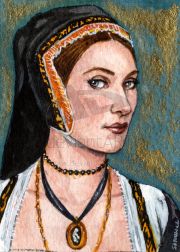Jane Boleyn, Lady Rochford Controversies
Jump to navigation
Jump to search
l Jane Boleyn by <a class="external" href="http://marksatchwill.deviantart.com/" rel="nofollow" target="_blank" title="Mark Satchwill">Mark Satchwill</a> DO NOT REDISTRIBUTE a modern artistic conception of Jane | Historical Controversies about Jane Boleyn, Lady Rochford Click EasyEdit to add this page! (Don't see the EasyEdit button above? <a href="../#signin" target="_self">Sign in</a> or <a href="../accountnew" target="_self">Sign up</a>.) |
| Why did Jane give the damning testimony about her husband George Boleyn & his sister Anne Boleyn? |
| She did not in actual fact testify in court against her husband or Queen Anne but Cromwell did use her statements to help build his case and these were supposedly read out in court. No one will ever know definitively but there are several theories including jealousy over her husband's infidelities, his attention to his sister whom she had fallen out with, religious differences, self promotion & court faction in-fighting. - she did participate in a demonstration against Anne Boleyn in the streets of London in 1535 which was certainly a hostile move against the whole Boleyn family. - perhaps her husband's extra-marital affairs had caused them to fall out & being estranged from him was seeking revenge? - she did however plead for her husband's life while he was in the Tower but was this an act? - George Boleyn stated that on the remarks of one woman others think so badly of him (deeply implying that he viewed the stories regarding his alleged conversations with Anne regarding the King’s impotency to have been raised by a certain individual. Perhaps Jane revealed or made up these conversations to Thomas Cromwell, Earl of Essex?). [Source: According to De Carles, regarding his wife Jane, he said that "On the basis of only one woman you are willing to believe this great evil of me, and on the basis of her allegations you are deciding my judgment."] - did she do it for personal gain since Cromwell did see that she was taken care of despite her husband's disgraced demise and she did return to court to serve Jane Seymour , Anne of Cleves & Katherine Howard. (She would later testify in July 1540 to aid the King's divorce from Anne of Cleves, stating that this Queen had confided in her that their marriage had never been consummated. This allowed the king to annul the marriage with Anne of Cleves and marry his teenage mistress, Katherine Howard.) - regarding the religious differences, Jane Boleyn nee Parker came from a strong conservative catholic family while George was actively promoting reformist ideas which would have been in direct opposition to her own beliefs. Plus the demonstration against Anne Boleyn was in support of Queen Katherine of Aragon & Princess Mary Tudor who were the figureheads for the catholic faction. - perhaps something happened in court, (maybe between Anne and Jane) that promoted the animosity? At one time Jane was supposedly aiding Anne in removing a lady the king was quite interested in. But roughly a year later she was protesting against Anne. Had the two clashed; was Jane dissatisfied with her marriage and just grew distant from Anne and the other Boleyns? - did she break under Cromwell's questioning or did he twist some innocent remarks to make them more than they were? - or maybe in May 1536 when she saw that her husband and sister-in-law were likely to die and she wanted to be on the winning side? Unfortunately since we have very little historical evidence - we will never know. |
| So which ladies DID testify against Anne in court? |
Out of a total of approximately 60 ladies in waiting in Anne's retinue - 2 ladies (besides Jane Boleyn) plus one hearsay evidence of a lady who had died 2 years previous were all Cromwell could find, but that evidence along with Jane Boleyn's statements and Mark Smeaton's confession was enough to condemn Anne and the 5 accused men. 1. Elizabeth Browne, Lady Worcester (sister of Sir Anthony Browne, a staunch supporter of Princess Mary Tudor, sister in law of William Brereton & step sister of Sir William Fitzwilliam who was heavily involved in the Boleyn enquiries) who Anne Boleyn had shown some concern for when she was pregnant while in the Tower and loaned her money. Alison Weir quotes her as saying [[[Anne Boleyn]]] "admitted some of her court to come into her chamber at undue hours". Although the full extent of her testimony was never made public because Cromwell said it was "so abominable", and it was used against Anne.2. Nan Cobham about whom nothing much is known except that she, along with two other ladies-in-waiting (the above mentioned Elizabeth Browne, Lady Worcester & it is presumed Margery Horsman) gave evidence against Anne Boleyn. From their testimony, Cromwell would maintain that "The Queen's incontinent living was so rank and uncommon that the ladies of her privy chamber could not conceal it" 3. Bridget Wiltshire, Lady Wingfield - whose deathbed (c.1534) knowledge of Anne Boleyn's early life & possible indiscretions were reported by her family to Cromwell (ie. hearsay). To whom Anne wrote a letter in 1532 after an argument: |